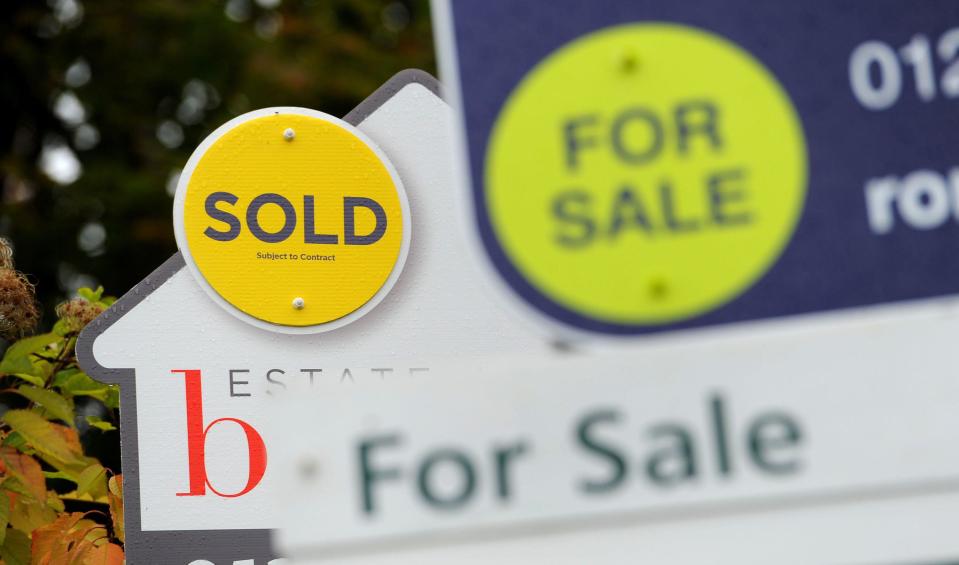

The UK housing market is facing ongoing challenges, with house prices continuing to fall, the latest Royal Institution of Chartered Surveyors (RICS) residential market survey shows.
RICS’ finding tallys with Halifax and Nationwide house price data published recently which showed properties are now £14,000 cheaper on average. The average price of a house in the UK is now £259,153.
Nationwide (NBS.L) also found in its monthly monitor that purchases involving a mortgage have slowed. Cash purchases though down from 2021 have remained stable.
Halifax’s house price index reported that UK house prices fell 2.4% in July compared to the same period a year ago.
Following the trend, the RICS survey found that the net balance fell to -68, the weakest reading since 2009.
Buyer enquiries and sale instructions also declined, indicating a sluggish market.
With four of the UK’s biggest mortgage lenders Halifax, HSBC, Nationwide, and TSB cutting some of their mortgage rates, what does buying a house look like now?
Halifax cut rates on its five-year fixed deal from 6.1% to 5.39%, Nationwide cut its fixed rates by 0.55 percentage and TSB by 0.4 points.
The Office of National Statistics (ONS) reported in June of this year that the average UK house price was £286,000 in April 2023, £9,000 higher than 12 months ago.
London’s average house prices remain the most expensive of any region in the UK, with an average price of £534,000 in April 2023, while the North East has lowest average house price of all English regions, at £160,000 in the same month.
RICS’s data showed that new buyer inquiries saw a slight dip from -45 to -47, mirroring the decline in new sale instructions from -17 to -26.
Survey respondents also reported a drop in newly agreed sales, falling from -45 to -47, the lowest reading for this indicator since the pandemic marking a downward trend in sales activity across the country.
“The latest feedback from RICS members continues to highlight a sluggish housing market with little relief in sight. High mortgage rates and economic uncertainty are keeping buyer inquiries subdued,” said Simon Rubinsohn, RICS chief economist.
The Bank of England raised its base rate to 5.25% at the beginning of last month with the next announcement to be on Thursday 21 September.
Read more: House prices: Is it better to rent than buy?
Read more: UK pay rises at record rate stoking fears of another interest rate rise
Lettings market sees tenant demand surge
In the rental market, tenant demand is on the rise, reported RICS by a net balance of +47% in contrast to the sales market.
Notably, all regions and countries across the UK witnessed a sustained increase in the demand for rental properties in recent months.
Though new landlord instructions continue to decline, with a net balance of -20% in August, industry insiders suggest that landlords are leaving the rental sector.
Watch: Am I wasting my money by renting?
Michael Brooker of Michael Brooker estate agents, based Crowborough in the South East, said there was a a “Lack of instructions. High demand.”
With this persistent gap between demand and supply, a net balance of +60% of survey contributors anticipate rental prices to rise over the next three months.
“Higher rents reflect higher interest rates and increased cost of living, rents will only go up,” said Amin Mohammed from Le Baron Haussmann Ltd in Greater Manchester, “due to demand and supply.”
Increasing demand and decreasing landlord participation factors in the rental market are expected to drive rental prices higher in the near future.
In London, Rupert Merrison from Dexters, said: “It’s been a busy summer market in lettings with high tenant demand – we anticipate a busy Autumn.”
Zoopla compared the average rent to the average monthly mortgage repayment for a first-time buyer and found that renting is cheaper than buying a home for the first time in 13 years.
The typical monthly rent is now 9.5% or £122 cheaper than the mortgage repayments for the same rental property.
Read more: UK rents to rise faster than house prices
Read more: Pound at lowest level since June as Bank of England signals ‘top’ for interest rates
The UK housing market
The RICS residential market survey is a monthly sentiment survey of chartered surveyors operating in the residential sales and lettings markets.
Here’s an overview of what the housing market looks like across the UK on what RICS members have seen in terms of house sales and prices.
North
“Less busy month but typical for this time of year. Difficulty in obtaining finance due to interest rates continues to affect buyer confidence.” Paul McSkimmings from Edward Watson Associates in Newcastle upon Tyne.
Yorkshire & the Humber
“The market is still difficult to gauge but demand for lower value houses is far greater than the higher end of the market which is now struggling with the lack of suitable buyers.” James Watts, from Robert Watts Estate Agents in Cleckheaton.
North West
“Interest rates have some effect but those not requiring finance are still active in the market (although offers made below the asking price now).” David Champion a registered valuer for Champsurv, covering Blackpool, Fylde Coast and Preston, Lancashire.
East Midlands
“July proved to be a busy month with lots of appraisals and subsequent deals agreed. The market appears to have accepted the new normal and normal service resumed. Another rate rise in September is likely, but market activity feels resilient at this stage.” Tom Wilson from King West estate agents in Stamford.
West Midlands
“The collapse in the sales market caused by interest rate rises in June continues with poor sales figures and very high fall-through figures.” Andrew Oulsnam from Oulsnam estate agents in Birmingham.
East Anglia
“Activity remains slow and the market outlook uncertain. I suspect it may now be 2024 before we see some traction within the residential sales market.” Kevin Burt-Gray from Pocock and Shaw in Cambridge.
South East
“It has picked up, for various reasons. Perhaps the concept of interest rates staying stable, prices being more realistic, but also the fact that buyers are running out of time, and can no longer be too choosy.” Andrew Burnett of Burnett’s Estate Agents in Mayfield.
South West
“Finally recessionary factors are taking hold of the housing market and it is palpable with more property than buyers because landlords are selling up as are some second home and holiday home owners which is a big part of the market in this area and expect this trend to consolidate for next three years.” David Hickman from Devon.
Wales
“The market remains subdued and as a consequence prices will have to be adjusted downwards to attract buyers. This situation is likely to continue for sometime to come.” John Corben of Corbens from Swanage, Wales.
“Viewing levels have been lower being a holiday period. Sales are being agreed, but below vendor expectations, many of whom are not aware of the impact of interest rates on values. Buyers are expecting discounts and sales are agreed when parties to a chain agree to share those discounts.” Anthony Filice of Kelvin Francis Ltd from Cardiff.
London
“House price sensitivity has continued against a backdrop of economic uncertainty. Whilst inflation seems to be on its way down, and mortgage rates may have peaked, affordability will remain stretched.” Alec Harragin from London of Savills Plc.
“If interest rates decrease, this will stimulate the market.” David Conway of David Conway & Co in Harrow.
“House sales remain reasonably robust but with the lack of buy-to-let buyers and many landlords needing to sell the flat market remains difficult. The Bank of England should try to offer some assistance by assuring the markets that interest rates will begin to fall early next year.” James Perris of Villiers Surveyors.
Scotland
“The market continues pretty much as it has all this year, with demand still outstripping supply, but buyers are more cautious about paying any more than a price at or around the home report value. Overall still positive despite the ongoing inflation and interest rate pressures.” Craig Henderson of Graham & Sibbald Llp in Ayrshire.
Northern Ireland
“Market demand has slowed. Properties at the lower end of the market are holding their own.” Daniel McLernon of D A Mc Lernon Ltd in Omagh.
Watch: How much money do I need to buy a house’
Download the Yahoo Finance app, available for Apple and Android.






